 Hartlepool Sports & Leisure
Hartlepool Sports & Leisure
- Cinemas, Theatres & Dance Halls
- Musicians & Bands
- At the Seaside
- Parks & Gardens
- Caravans & Camping
- Sport
 Hartlepool Transport
Hartlepool Transport
- Airfields & Aircraft
- Railways
- Buses & Commercial Vehicles
- Cars & Motorbikes
- The Ferry
- Horse drawn vehicles
 A Potted History Of Hartlepool
A Potted History Of Hartlepool
- Unidentified images
- Sources of information
- Archaeology & Ancient History
- Local Government
- Printed Notices & Papers
- Aerial Photographs
- Events, Visitors & VIPs
 Hartlepool Trade & Industry
Hartlepool Trade & Industry
- Trade Fairs
- Local businesses
- Iron & Steel
- Shops & Shopping
- Fishing industry
- Farming & Rural Landscape
- Pubs, Clubs & Hotels
 Hartlepool Health & Education
Hartlepool Health & Education
- Schools & Colleges
- Hospitals & Workhouses
- Public Health & Utilities
- Ambulance Service
- Police Services
- Fire Services
 Hartlepool People
Hartlepool People
 Hartlepool Places
Hartlepool Places
 Hartlepool at War
Hartlepool at War
 Hartlepool Ships & Shipping
Hartlepool Ships & Shipping

St Bega's Roman Catholic School
Details about St Bega's Roman Catholic School
The original school opened in 1884 in an old Presbyterian chapel and three cottages in Throston Street and there were 290 on roll. The current St Bega's School in Thorpe Street opened in 1973 and the old buildings were demolished in June 1976.
Location
Related items :
 A child's view of the War by Ray Cummings
A child's view of the War by Ray Cummings
In 2005 Hartlepool's Museum and Library Services worked together on a project called 'Their Past, Your Future', which commemorated the part played by local people in the Second World War. As part of the project Ray Cummings reminisced about being a child in the War years. This is his story, in his own words:
I was born 1934 and started school in 1939, the year war broke out. I can remember we all gathered in school and the teacher told us what was happening and we were only five year old. Later on about 1940 or ‘41 I went to school with me cousin who was the same age as me. The teacher took her out and told her her father got killed on the beach. He was going down Marine Drive to the beach for sea coal and he’d seen this old chap trying to put a mine in a pram, and he went to stop him and it blew up and they both got killed. Later on they barricaded the beach off, put barbed wire up. There were soldiers there at the Spion Kop area and also on the Town Moor, and we used to go down, my friends and me, and they used to give us sandwiches, bread and jam and things like that. Food was the shortest thing, then. I lived in Mary Street on the Headland, and it was about three streets away from Marine Drive and the seafront. And there was the Steetley Magnesia factory up on the Spion Kop, and the Germans used to come over and try and bomb it. The German bombers used to follow the rivers up to the steelworks around Middlesbrough and come back, and any bombs left got dropped at Steetley or Hartlepool. They dropped this land mine and it hit Marine Drive and all the windows for about three streets were put out. And I can remember another family on the Central Estate where a bomb dropped on a house and the family were killed.
Me father worked in the Steetley Magnesia and my elder brother worked in the shipyard and that was a job were you couldn’t go in the Army. Father and me brother were in the Home Guard and used to bring their guns home, no bullets in but we thought that was a great thing. They had the Army uniform and they had a rifle.
I went to St Bega’s School and they built an air raid shelter there. It was for not only the schools but also people living round that area. And some people had their own shelters in the back garden. Anderson shelters which they got off the government. Me granny lived a street away and she used to come down every night to sleep at our house because she was by herself. She was frightened and we used to take her down the shelter. They took blankets down there. Took maybe food because you might have been there all night. And people used to just sit. There was seats and it was a bit dampish naturally, but we had sing-songs to cheer us up. Then you could hear the siren going and the warden would come down and say “right ho, it’s all clear, back home”. And you got used to it in the end. I knew nothing else but that when I was a boy – War. It was a good time in a way, but a bad time for people. If you seen a telegraph boy going to a house you knew somebody had gone.
You used to hear the German planes coming and you knew they were Germans because there was a sort of different zoom in the engines. And if you went out and looked up you could see the searchlights and then the ack-ack firing at them. I can remember on the docks at Hartlepool they used to have barrage balloons. It was big, full of gas and they used to hang them over the dock areas and if the Germans come low and hit that they used to get entangled in the thing. It was chained, fastened down to the ground. I can remember once when one of the balloons escaped and they had to chase it, and they caught it and brought it back. The balloons were a deterrent in a way, to keep the Germans away from the docks. But they still come over and bombed. They were after Steetley Magnesia because they knew Steetley used to get stuff out of the sea that was going in to make steel. Something in the magnesia they’d got out of the sea was into the making of steel. I don’t think they ever bombed it, but they hit Hartlepool a few times.
I would be about six or seven years old and I didn’t know nothing about what was going on, but me mother and father used to tell us about things and Hitler and all that. We used to listen to the radio a lot to Lord Haw-Haw and all that. You were a bit frightened at the time, you know, because England had nothing to defend ourselves. But it was a great time for the community because we used to get together and help each other. Neighbours helped you. You had a ration book and you only got so much sugar and so much meat and that. But the mothers were great because they used to make a stew called Panakity, with all sorts tossed in, and they baked their own bread. You weren’t hungry, there was always something there when you got home from school. Your mother had done something, or maybe a lady next door had made a pan of stew and there was some left and she gave it to you. Or my mother maybe baked and gave her some stuff. They really got together- communities.
It was a very exciting time for a boy my age. We used to go to the pictures and maybes a cowboy was on, Roy Rogers or something, and then all of a sudden you had to go out because there was the air raid sirens. You had to go down the shelter and listen, wait and then go home. And there was no lights, it was all dark. Mothers and fathers knew if you get caught in an air raid that somebody else will take you down the shelter and help you. You still played your school football and stuff, and it was a great time like that. The footballs had a bladder inside, not like these of the present day. So if you hadn’t a football you had a bladder, and kicked that about. You played cricket with a bit of wood and a few sticks. Or you played “kick the tin”. Another game was bouler. It was a cycle wheel - the steel, what the tyre goes on. Take all the spokes out, you had a ring. And get a bit of wire on a stick and you used to put the wire round it and run around, and it was great. We used to race each other, try to do tricks with it. There was no youth clubs or nothing like that. We used to go all round the town. Your mother would let you out because they knew you were safe, not like there is today. I remember we were going on this trip to West Hartlepool. That was a few miles away. We thought it was great going on the bus, and we won playing another Catholic school, I think it was St. Joseph’s, at football. We were only going a few mile away, and that was great because you never left your little place where you lived. It was like a little village on the Headland and everybody knew you.
At Christmas you used to make streamers for decorations because you couldn’t buy them. You didn’t get a lot of presents. I remember my father knew this chap who used to make these wooden tanks, and we used to get them. Maybes sometimes you got an orange, but you never got no bananas, they were rare. I can’t remember seeing one till after the war. Didn’t know what they were. You used to go round to the butchers and take your ration book. You had the clothing coupons and all, to buy clothes. Or people passed them down. A neighbour had an older son than me, and she passed the clothes down – his clothes to me. In summer a lot of the children played in their bare feet. Now and again you used to get a new pair of boots for the winter. But there again kids grow out of boots and you pass them down to your younger brother. And me father had a last to cobble his own shoes. He got the old rubber off the conveying belts at Steetley Magnesia and put it on our boots. Because you couldn’t get leather, so you put that on your boots. It made you about another six feet taller, but it lasted. And he used to cut our hair. He had these shears and we used to get what they called a “tar brush”. It used to be all cut short with a little tuff on the front. But everybody was like that. There was nobody who would take the Mickey out of you because everybody was the same.
I can remember on VE-Day we listened to the radio and I remember Winston Churchill making his great speeches. And this man with a big drum and all the people with young kids behind him singing and shouting and going round the town, on the Headland, banging this great big drum because the war was over. They had street parties and all the kids were invited. And again the mothers found food, they made cakes and puddings and things like that. Jelly and custard and stuff. We were stuffing ourselves with food which we had never seen. I can remember after the war when men were coming home from Japanese and German prisoner of war camps and they were putting street parties on for them. But the Japanese prisoners of war couldn’t eat a lot of food because they were starved, because their bodies had shrunk.
It’s a great time when the community’s together, and that’s what it should be today. They were very close then.
More detail » Class 1 - date unknown
Class 1 - date unknown
 Created by unknown
Donated by Mr. Bobby Black
Created by unknown
Donated by Mr. Bobby BlackClass 1 at St. Bega's school, un-dated and no names known.
More detail » Class 2 - 1951
Class 2 - 1951
 Created by unknown
Donated by Mr. Bobby Black
Created by unknown
Donated by Mr. Bobby BlackDated 1951
St. Bega's Infants, Class 2, 1951. Unfortunately we don't know the names of any of these children.
More detail » Class 3 - date unknown
Class 3 - date unknown
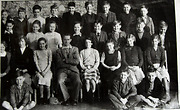 Created by unknown
Donated by Mr. Bobby Black
Created by unknown
Donated by Mr. Bobby BlackAn un-dated photograph of staff and pupils of St. Bega's Class 3.
More detail » Original St Bega's School
Original St Bega's School
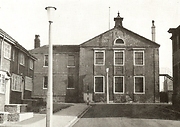 Donated by unknown
Donated by unknownThe current St Bega's school was opened in 1973 to replace this building which had originally been the Presbyterian Church.
More detail » St Bega's - 1949
St Bega's - 1949
 Created by unknown
Donated by Mr. Bobby Black
Created by unknown
Donated by Mr. Bobby BlackDated 1949
Staff and pupils at St. Bega's, dated June 2nd, 1949. Do you know anyone in the photograph?
More detail » St Bega's 1959
St Bega's 1959
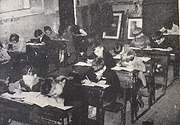 Created by NDM
Donated by Hartlepool Museum Service
Created by NDM
Donated by Hartlepool Museum ServiceDated 1959
The last days for older children at St Bega's. In 1959,when St Peter's RC Secondary School opened in King Oswy Drive, only the youngest children remained at St Bega's until a new primary school opened 13 years later in Thorpe Street.
More detail » St Bega's Football Team - 1960
St Bega's Football Team - 1960
 Created by unknown
Donated by Mr. Bobby Black
Created by unknown
Donated by Mr. Bobby BlackDated 1960
St Bega's 1960 Football Team.
More detail » St Bega's School
St Bega's School
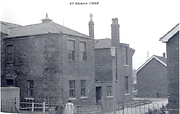 Created by unknown
Donated by Mr. Bobby Black
Created by unknown
Donated by Mr. Bobby BlackDated 1968
A view of St. Bega's school taken in 1968. The school had originally been a Presbyterian church.
More detail » St Bega's at the Pool
St Bega's at the Pool
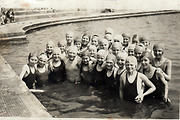 Created by unknown
Donated by Mr. Bobby Black
Created by unknown
Donated by Mr. Bobby BlackA photograph believed to show pupils from St Bega's at the Open-Air Swimming Pool, date approx 1930.
More detail » St Bega's pupils off to Belgium
St Bega's pupils off to Belgium
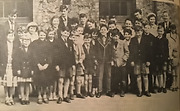 Created by NDM
Donated by Hartlepool Museum Service
Created by NDM
Donated by Hartlepool Museum ServiceDated 1958
These children, although probably not the toddler on the far right, were offon a nine day visit to Holland and Belgium in 1958. The accompanying teachers are on the left Mr K Young and on the right Mr Frank Broughton.
More detail » Teachers
Teachers
 Created by unknown
Donated by Mr. Bobby Black
Created by unknown
Donated by Mr. Bobby BlackAn un-dated photograph of the teachers at St. Bega's school.
More detail »



